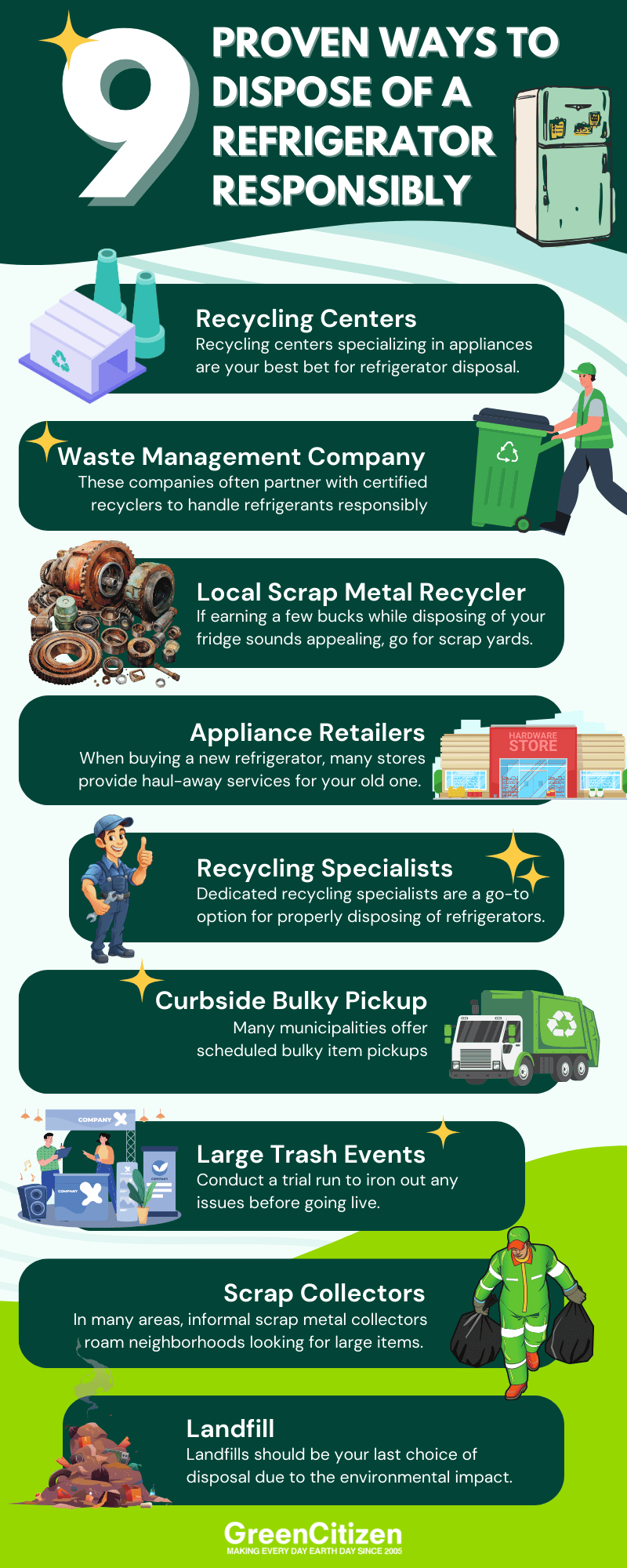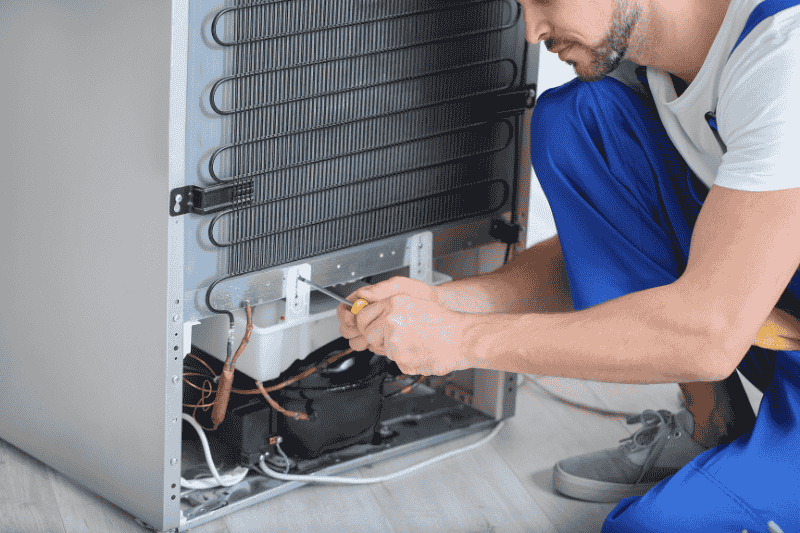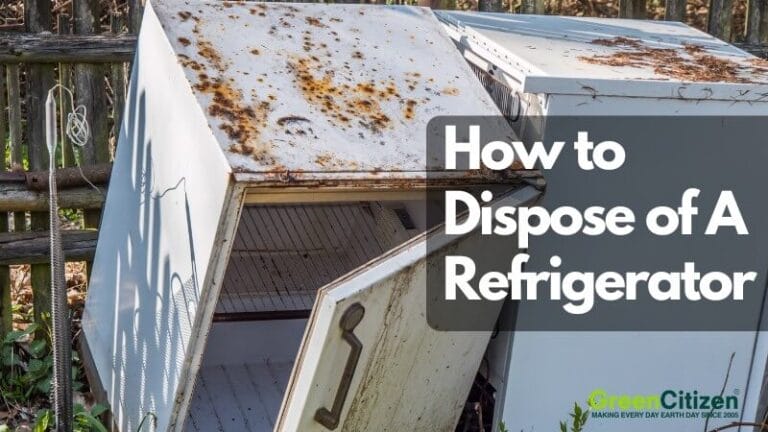Every year, over 9 million refrigerators are discarded in the U.S.—and no, you can’t just leave them on the curb. Fridge disposal requires care because these appliances contain refrigerants like Freon, toxic oils, and heavy metals. If mishandled, they can leak pollutants and contribute to climate change—10% of global greenhouse gas emissions stem from improperly managed refrigerants.
So how to dispose of a refrigerator safely, legally, and maybe even for free?
From local fridge recycling programs to retailers that pick up old refrigerators, there are responsible options that protect the environment—and help you avoid fines.
In this guide, we’ll cover how fridge disposal works, the best options near you, and how to ensure your appliance is recycled, not wasted.
Key Takeaway: Best Ways to Recycle a Refrigerator Near You
To dispose of a refrigerator responsibly, use a certified appliance recycling center, municipal bulky item pickup, or a retailer’s haul-away service. Refrigerants like Freon must be removed by professionals. Use tools like the Green Directory to find fridge disposal options near you and stay compliant with environmental regulations.
How to Dispose of a Refrigerator Responsibly (9 Options Near You)
There’s no one-size-fits-all method for refrigerator disposal. Depending on your location, budget, and local laws, you may have access to several options—from certified recycling centers and scrap yards to municipal pickups and appliance trade-ins.
Below are 9 proven ways to get rid of your old fridge safely and legally.

1. Recycle Your Fridge at a Certified Recycling Center
✅ Best for: Eco-conscious fridge disposal with refrigerant handling
Recycling centers that specialize in large appliances are the safest and most eco-friendly option. These facilities remove and neutralize Freon (R-22) and other refrigerants before recycling the metal, plastic, and insulation.
Use the EPA’s RAD (Responsible Appliance Disposal) program or GreenCitizen’s Green Directory to find a fridge recycling center near you.
2. Schedule a Pickup with Your Waste Management Company
✅ Best for: Convenient local fridge pickup
Many waste services like Recology or WM offer scheduled bulky waste pickups, including refrigerators. They often work with certified recyclers to safely manage refrigerants.
Check their rules—most require you to remove fridge doors and ensure the unit is empty before pickup.
3. Drop Off at a Scrap Metal Yard (After Removing Freon)
✅Best for: Getting paid for fridge disposal
Some scrap metal recyclers accept refrigerators because of their copper, steel, and aluminum. However, you must remove Freon first or find a facility that does. Call ahead to ask about their requirements and whether they offer compensation for the unit.
4. Ask Appliance Retailers About Fridge Haul-Away Services
✅Best for: Hassle-free disposal when buying a new fridge
Retailers like Best Buy, Home Depot, and Lowe’s often offer refrigerator haul-away services when you purchase a new appliance. Some provide free fridge disposal, while others charge a small fee.
These companies typically partner with certified recyclers to handle refrigerant removal and proper dismantling. Always ask if your old unit will be responsibly recycled.
5. Hire an Appliance Recycling Specialist
✅Best for: Professional, full-service fridge recycling
Appliance recycling specialists focus specifically on old refrigerator removal and environmental compliance. They manage refrigerants like Freon and recover valuable metals and plastics. This option may come with a fee, but it ensures your fridge won’t end up in a landfill.
Search for fridge recycling near me to find a certified provider in your area.
6. Schedule a Curbside Bulky Item Pickup
✅Best for: Residents using city-run waste programs
Many cities offer bulky item collection services for large appliances. These pickups are convenient but usually require advance scheduling and prep. Make sure your fridge is completely empty and that the doors are removed. You may also need to provide proof that the refrigerant has been extracted by a licensed technician.
Note: Freon must be removed prior to scheduling curbside pickups.
7. Attend a Local Large Trash or Recycling Event
✅Best for: One-time community-based disposal
Some municipalities hold appliance recycling events where residents can drop off refrigerators for free or at a discount. These events are seasonal and vary by location, so check your city’s website.
They often include trained staff who handle refrigerants safely. It’s a great way to dispose of a refrigerator responsibly—without scheduling a pickup.
8. Leave It Curbside for a Scrap Collector (With Caution)
✅Best for: Informal, last-minute fridge removal
In some neighborhoods, independent scrap collectors pick up appliances left at the curb. While convenient, this method carries risk: many don’t have the training or equipment to handle refrigerants, which can lead to environmental harm.
If you go this route, remove the doors and confirm that the Freon has already been extracted.
9. Drop It Off at a Landfill (As a Last Resort)
✅Best for: Last-resort refrigerator disposal
Landfills should be your final option for fridge disposal. Many states—including California, New York, and Massachusetts—ban appliances with refrigerants from landfills. If your landfill does accept refrigerators, they must first remove hazardous components like Freon.
Contact the facility in advance to confirm their fridge disposal rules and avoid penalties.
TL;DR: How to Dispose of a Refrigerator Responsibly
To dispose of a refrigerator safely, use certified recycling centers, appliance haul-away programs, or local bulky item pickups. Retailers like Best Buy may offer free fridge disposal when delivering a new unit. Scrap yards and recycling events are other options, but Freon must be removed first. Always check local laws to avoid fines and ensure eco-friendly handling.
How to Find a Refrigerator Recycling Center Near You
Most curbside programs don’t accept refrigerators due to Freon and compressor hazards—so how do you find a certified recycling center near you?
Many local recycling programs and certified centers accept refrigerators, but finding the right one can be tricky—especially with regulations around Freon and appliance dismantling.
To find a refrigerator recycling center near you, start with tools that connect you to verified, eco-friendly disposal options:
- GreenCitizen’s Green Directory: Simply enter your ZIP code and select “Refrigerator” or “Appliances” to view a list of certified recycling centers in your area. Every listing includes details on accepted items, fees (if any), and drop-off or pickup options.
- EPA RAD Program: The Environmental Protection Agency’s Responsible Appliance Disposal program helps you find partners that safely remove refrigerants and recycle appliances.
- Municipal Waste Websites: City or county waste management pages often list local bulky item programs or drop-off locations.
When contacting a recycler, ask if:
- They are certified to handle Freon removal
- They offer free refrigerator disposal
- Pickup services are available
Using a directory service ensures your fridge doesn’t end up illegally dumped or sent overseas. It also helps recover valuable metals and keep toxic chemicals out of landfills.
What Recyclable Materials Can Be Recovered from an Old Refrigerator?
Old refrigerators contain more than just bulky hardware—they’re packed with valuable and recyclable materials like metals, plastics, refrigerants, and electronics.
Below is a breakdown of the key components recyclers recover and how each material is handled during the refrigerator recycling process.
| Category | Details |
|---|---|
| Metals | Steel: Used in the outer casing and internal parts; recyclable and valuable. Copper: Found in the compressor and wiring; highly valuable. Aluminum: Present in components like condenser coils. |
| Plastics | Inner linings and shelves are made of plastics, which can be recycled after sorting and cleaning. |
| Compressors | Contain oil and fluids requiring careful disposal; include recyclable parts like copper and aluminum. |
| Refrigerants | Safely extracted refrigerants can sometimes be purified and reused, though not always cost-effective. |
| Insulation Foam | Foam may be incinerated if it contains CFCs or recycled into lower-value products in certain cases. |
| Electronics | Thermostats, circuit boards, and switches can be recovered, though they are typically low-value items. |
Is It Illegal to Throw Away a Refrigerator?
It’s not always flatly illegal to “throw away” a fridge, but it’s illegal to dispose of it improperly — which usually applies to trashing, dumping, or curbside disposal without refrigerant recovery. These appliances are regulated under federal and state laws to prevent environmental contamination and ozone-depleting emissions.
Here’s a breakdown of the laws that govern refrigerator disposal:
Federal Refrigerator Disposal Laws
1. Clean Air Act (CAA)
The Clean Air Act makes it illegal to release harmful refrigerants like CFCs, HCFCs, or HFCs into the atmosphere when getting rid of a refrigerator. Certified technicians must use approved equipment to safely recover refrigerants before recycling or dismantling the appliance. The EPA’s Responsible Appliance Disposal (RAD) program enforces compliance by promoting the safe recycling of refrigerants, foam, and metals from refrigerators.
2. Resource Conservation and Recovery Act (RCRA)
This RCRA law focuses on managing hazardous waste, including the oils and refrigerants found in refrigerators. It ensures these materials are handled properly to avoid environmental contamination during disposal or recycling.
3. National Appliance Recycling Laws
The EPA requires appliance manufacturers and sellers to follow specific recycling rules for appliances with refrigerants. This ensures that manufacturers contribute to responsible disposal practices.
State and Local Refrigerator Disposal Laws
1. Mandatory Appliance Recycling Program
Some states, like California, require refrigerators to be recycled only at certified facilities. Retailers selling new refrigerators must often provide haul-away services for old ones.
2. Refrigerant Management Programs
Certain states, including New York and Washington, enforce stricter refrigerant management laws. These rules make sure that harmful substances like Freon are safely removed before disposal.
3. Landfill Bans
States like Massachusetts and California ban refrigerators from being dumped in landfills. Instead, they must go to certified recycling facilities to ensure safe handling of hazardous materials.
4. Extended Producer Responsibility (EPR)
In states like Oregon and Vermont, manufacturers are required to help manage appliance recycling programs. These laws hold producers accountable for the entire lifecycle of their products, including disposal.
TL;DR: You can’t legally throw a refrigerator in the trash. Federal and state laws require certified removal of refrigerants and proper recycling through approved programs.
Why Is Refrigerator Disposal So Challenging?
Recycling a refrigerator isn’t as simple as dropping it off at a curb. These appliances are large, complex machines that contain hazardous materials, regulated refrigerants, and a mix of difficult-to-separate components.

Here’s why proper refrigerator disposal requires specialized processes:
Safe Removal of Refrigerants
Refrigerators contain refrigerants like Freon (CFCs) or HFCs, which are potent greenhouse gases. Under the Clean Air Act, these substances must be recovered by certified technicians before recycling. Improper handling can lead to ozone depletion, air pollution, and legal penalties.
Insulating Foam Contains Toxic Gases
Older fridges often have polyurethane insulation foam that contains ozone-depleting substances. Removing and neutralizing this foam requires special equipment and disposal protocols to prevent releasing harmful gases into the environment.
Complex, Labor-Intensive Dismantling
Refrigerators are built from steel, copper, aluminum, plastic, electronics, and foam—all tightly integrated. Separating these components safely and efficiently demands specialized machinery and manual labor, increasing time and costs.
Bulky Size and High Transportation Costs
Fridges are heavy and hard to move. Transporting them to a certified recycling facility can be cost-prohibitive, especially in areas without local appliance recyclers. This often discourages responsible disposal.
Low Economic Return from Materials
While refrigerators contain recyclable metals, the market value of recovered materials often doesn’t offset the cost of extraction, refrigerant removal, and transport. This makes fridge recycling economically challenging for many facilities.
In short, refrigerators are one of the most complex household appliances to recycle. Their size, toxic contents, and low scrap value all contribute to why fridge disposal requires certified professionals and can’t be left to regular waste services.
Is Recycling Refrigerators Profitable for Recyclers?

Refrigerators contain valuable materials, but recycling them rarely turns a profit. The cost of labor, transport, and hazardous material handling often outweighs the value of what recyclers can recover.
Here’s a breakdown of what recyclers gain—and why it’s financially challenging:
Metals Are Valuable—But Not Enough
Steel, copper, and aluminum are the most profitable parts of a fridge, especially copper found in the compressor and wiring. However, the volume of these materials is relatively low compared to the cost of manual labor, sorting, and hazardous material management. Even with high scrap prices, the margins are tight.
Plastics Add Processing Costs
While recyclable, the interior plastics require extensive cleaning, sorting, and transportation—and they have very low resale value. Most recyclers consider them a cost rather than a revenue stream.
Refrigerants Are Cost Centers
Refrigerants must be safely extracted and reclaimed by certified technicians, per federal law. The process involves expensive equipment and strict compliance, with little to no economic return unless the refrigerant can be reused—which isn’t always feasible.
Insulation Foam Creates Disposal Burdens
Older refrigerators may contain ozone-depleting foam that can’t be reused or resold. Disposal often requires incineration or conversion into low-value materials, adding to operational costs without creating income.
Electronics and Compressors Have Limited Return
Compressors contain small amounts of copper and aluminum, but extracting them requires labor and proper oil disposal. Internal electronics—like thermostats or switches—can be recovered, but they hold little market value and rarely justify the effort.
Bottom line: Recycling a refrigerator responsibly isn’t lucrative—but it’s necessary. Proper processing prevents environmental harm, supports material recovery, and ensures compliance with federal and state regulations.
Frequently Asked Questions (FAQ)
The amount depends on the condition and materials. Scrap yards may pay $10–$50 for the metal, while resale could fetch $50–$200 if it still works.
Sell it online through marketplaces like Craigslist or Facebook if it’s functional, or take it to a scrap yard for the metal value.
Yes, they contain valuable materials like steel, copper, and aluminum. Working units can also be sold or donated.
Yes, refrigerants can be extracted, purified, and reused. However, this process requires certified equipment and trained professionals.
Certified technicians use specialized equipment to safely remove refrigerants, which are then cleaned and reused or safely disposed of according to EPA guidelines.
Most refrigerator water filters are not recyclable through curbside programs, but some manufacturers or specialty recyclers may accept them.
Check with the filter manufacturer or local recycling programs. Some brands offer mail-in recycling services for used filters.
Final Answer: How to Dispose of a Refrigerator Responsibly
Refrigerators can’t just be tossed in the trash. They contain hazardous refrigerants, valuable metals, and bulky components that require certified handling. Improper disposal can lead to legal fines, ozone-depleting emissions, and lost recycling opportunities.
The good news? There are responsible options near you. Whether through a certified recycling center, municipal pickup, or a retailer’s haul-away program, fridge disposal doesn’t have to be difficult—or dangerous.
Use the Green Directory to find local, verified refrigerator recyclers who follow safe and legal disposal practices.
Take the right step—dispose of your old refrigerator the way it was meant to be handled.
